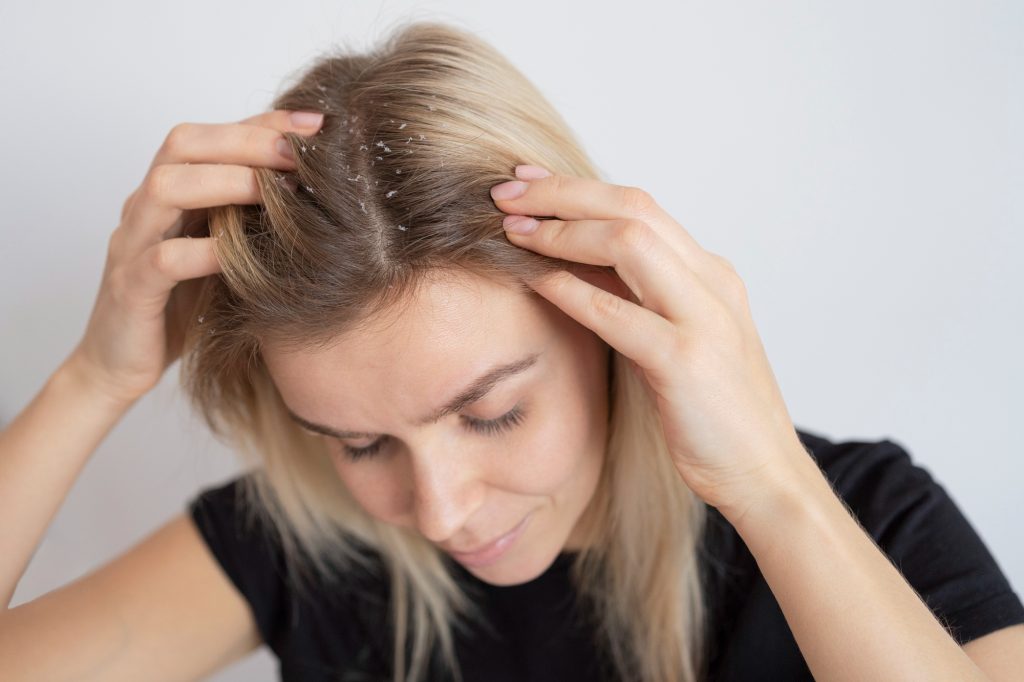Discover the connection between stress, hormonal changes, and dandruff in this informative article.
Can Stress and Hormonal Changes Cause Dandruff?
If you’ve ever found yourself scratching your head and wondering what’s causing those pesky white flakes on your shoulders, stress and hormonal changes may be to blame. Yes, it turns out that these two factors can actually contribute to the development of dandruff. So, let’s dive deeper into the world of dandruff, exploring its causes, symptoms, and the fascinating connection between stress, hormones, and our scalp health.
Understanding Dandruff: Causes and Symptoms
Before we delve into the stress and hormonal aspects of dandruff, let’s first get acquainted with what dandruff actually is. Essentially, dandruff is a common scalp condition that results in the shedding of dead skin cells in the form of white flakes. These flakes can be itchy, embarrassing, and just downright annoying.
In most cases, dandruff arises from a combination of factors, including oily skin, certain skin conditions, and overgrowth of yeast-like fungus called Malassezia. But stress and hormonal changes also play sneaky roles in this scalp debacle.

What is Dandruff?
Picture your scalp as a bustling metropolis, with billions of skin cells living, working, and eventually shedding. This natural process usually takes around a month, but in the case of dandruff, it speeds up. The result? An excessive turnover of skin cells, leading to those visible flakes we’ve all come to dread.
Imagine the surface of your scalp as a delicate ecosystem, a complex web of interactions between skin cells, sebaceous glands, and microorganisms. When this delicate balance is disrupted, dandruff can rear its flaky head.
One of the main culprits behind dandruff is an overgrowth of the fungus Malassezia. This fungus is naturally present on the scalp, but when it multiplies uncontrollably, it can lead to an inflammatory response, causing the skin cells to shed more rapidly. The excess shedding of skin cells results in the formation of those pesky white flakes.
Another factor that can contribute to dandruff is oily skin. The sebaceous glands on the scalp produce an oily substance called sebum, which helps keep the scalp moisturized. However, when the production of sebum goes into overdrive, it can create an environment that is conducive to the growth of Malassezia, leading to dandruff.
Common Causes of Dandruff
Dandruff can be triggered by various factors, such as dry skin, poor hygiene, certain skin conditions like eczema or psoriasis, and fungal infections. These culprits can throw your scalp’s ecosystem off balance, resulting in dandruff flare-ups.
Dry skin is a common culprit behind dandruff. When the skin on your scalp becomes dry and flaky, it can lead to an increased shedding of skin cells, causing dandruff. This can be exacerbated by harsh shampoos, hot showers, and cold weather, which can strip the scalp of its natural oils and further contribute to dryness.
Poor hygiene practices can also contribute to dandruff. If you don’t wash your hair regularly or if you don’t cleanse your scalp properly, it can lead to a buildup of dead skin cells, oil, and dirt, creating an environment that is conducive to dandruff formation.
Individuals with certain skin conditions like eczema or psoriasis are more prone to developing dandruff. These conditions can cause inflammation and irritation of the scalp, leading to an increased turnover of skin cells and the formation of dandruff flakes.
Fungal infections, such as tinea capitis, can also cause dandruff. These infections are caused by various types of fungi that can invade the scalp and disrupt the normal balance of the scalp’s ecosystem. This disruption can lead to increased shedding of skin cells and the development of dandruff.
Recognizing Dandruff Symptoms
Identifying dandruff is like spotting a snowflake in a winter wonderland. It’s easy! Look out for those telltale white flakes peppering your hair and shoulders. You might also experience an itchy, irritated scalp, which can lead to constant scratching and further aggravate the situation.
When dandruff flakes are present, they can be visible on the scalp, hair, and even on clothing. These flakes are typically small and white, resembling tiny pieces of dry skin. They can be more noticeable on dark-colored clothing, making dandruff a source of embarrassment for many individuals.
In addition to the visible flakes, dandruff can also cause scalp itching and irritation. The constant itching can be bothersome and may lead to scratching, which can further damage the scalp and exacerbate the dandruff condition.
It’s important to note that dandruff is a chronic condition, meaning it can come and go over time. Flare-ups can be triggered by various factors, such as stress, hormonal changes, certain medications, and even diet. Understanding the causes and symptoms of dandruff is the first step towards effectively managing and treating this common scalp condition.
The Connection Between Stress and Dandruff
Now that we’ve got the basics covered, let’s take a closer look at the fascinating relationship between stress and dandruff. Ah, stress – the unwelcome guest that always knows how to ruin a good hair day.
But what exactly happens when stress pays a visit to our scalp? How does it disrupt our body’s delicate balance and affect the health of our scalp? Let’s dive deeper into the science behind it.
How Stress Affects the Scalp
When stress strikes, it sets off a chain reaction of chemical changes in our bodies. One of the key players in this process is cortisol, often referred to as the stress hormone. Cortisol levels can become imbalanced under stress, which can have a direct impact on the proper functioning of our immune system, including our scalp’s defenses against dandruff-causing culprits.
Our immune system plays a crucial role in maintaining the health of our scalp. It helps to ward off harmful microorganisms, such as the Malassezia fungus, which is a common culprit behind dandruff. When stress disrupts the immune system, it weakens the scalp’s natural defenses, making it more susceptible to dandruff.
Stress-Induced Dandruff: The Science Behind It
Believe it or not, stress can actually alter the natural environment of our scalp, creating a more hospitable place for dandruff to thrive. One way stress does this is by increasing the production of oil on the scalp. This excess oil, known as sebum, can become a breeding ground for the Malassezia fungus, leading to dandruff.
Furthermore, stress can disrupt the normal turnover of skin cells on the scalp. Under normal circumstances, old skin cells are shed and replaced by new ones in a balanced and controlled manner. However, when stress comes into play, this process can be thrown off balance. Skin cells may start to flake off more rapidly, resulting in an itchy, flaky scalp – a classic symptom of dandruff.
So, the next time you find yourself stressed out, remember that it’s not just your mood that may suffer. Your scalp might also be affected, leading to the pesky presence of dandruff. Taking steps to manage stress and maintain a healthy scalp can go a long way in keeping those white flakes at bay.
Hormonal Changes and Dandruff
As if stress wasn’t enough of a pesky accomplice, hormonal changes can also throw a wrench into our scalp’s delicate ecosystem. Hormones, the chemical messengers of our body, have a profound impact on various bodily functions, including the health of our skin.
But what exactly are hormones and how do they affect our skin? Hormones are substances produced by various glands in our body, such as the pituitary gland, thyroid gland, and adrenal glands. They travel through our bloodstream, acting as messengers, and regulate many important processes in our body, including our skin health.
Hormones and Skin Health
Our hormones play a crucial role in maintaining the balance of oils produced by our sebaceous glands. These glands are responsible for producing sebum, a natural oil that helps keep our skin moisturized and protected. When hormones fluctuate, as they often do during puberty, pregnancy, or menopause, it can lead to an overproduction of oils, potentially triggering dandruff.
During puberty, for example, the body goes through significant hormonal changes as it transitions from childhood to adulthood. This surge in hormones, such as androgens, can stimulate the sebaceous glands to produce more oil than usual. The excess oil can then mix with dead skin cells and other substances on the scalp, leading to the formation of dandruff.
The Role of Hormonal Imbalance in Dandruff Development
These hormonal imbalances can upset the delicate harmony of the scalp, creating the perfect storm for dandruff to rear its flaky head. The excess oil produced during hormonal changes can mix with dead skin cells and the Malassezia fungus, resulting in dandruff flare-ups.
The Malassezia fungus is a naturally occurring microorganism that resides on our scalp. Under normal circumstances, it doesn’t cause any harm. However, when there is an overgrowth of this fungus, coupled with hormonal imbalances, it can lead to scalp inflammation and dandruff.
Furthermore, hormonal changes can also affect the immune system’s response to the Malassezia fungus. When hormones are imbalanced, the immune system may not function optimally, making it harder for the body to keep the fungus in check. This can further contribute to the development of dandruff.
It’s important to note that hormonal changes are just one piece of the puzzle when it comes to dandruff development. Other factors, such as genetics, diet, and personal hygiene, also play a role. Understanding the complex interplay between hormones and dandruff can help us better manage and prevent this common scalp condition.
Other Factors That May Contribute to Dandruff
Now that we’ve explored the stress and hormonal tag-team duo, it’s essential not to overlook other factors that can contribute to dandruff. After all, dandruff is a multifaceted condition that likes to keep us guessing.

Diet and Dandruff
What we put into our bodies can have an impact on our scalp health. Diets high in sugar, unhealthy fats, and processed foods may contribute to inflammation and exacerbate dandruff symptoms. So, it’s time to bid adieu to those donuts and embrace nourishing, scalp-loving foods.
Weather and Dandruff
Yes, even the weather can have a role in the dandruff drama. Dry air, common during winter months, can dehydrate the scalp, making it more prone to flaking. On the flip side, humid conditions can provide a perfect environment for the Malassezia fungus to party on our scalps. Mother nature always keeps us on our toes!
Preventing and Treating Dandruff
Now that we’ve covered the nitty-gritty of stress, hormones, and other factors behind the dandruff mayhem, let’s explore some strategies for preventing and treating this pesky scalp condition.
Stress Management Techniques for Dandruff Control
To combat stress-induced dandruff, it’s essential to find healthy ways to manage stress levels. Whether it’s through exercise, meditation, or indulging in your favorite hobbies, make self-care a priority. Your scalp will thank you!
Hormone Regulation and Dandruff Prevention
While we can’t control our hormones entirely, there are steps we can take to support their balance. Eating a balanced diet, getting regular exercise, and reducing exposure to hormone-disrupting substances can all contribute to healthier hormone levels and potentially less dandruff.
Topical Treatments and Home Remedies for Dandruff
When dandruff strikes, and you’re in a pinch, there are plenty of topical treatments and home remedies to turn to. From medicated shampoos containing anti-fungal ingredients to natural remedies like tea tree oil or apple cider vinegar, there’s a solution for every flake-fighting warrior out there.
So, the next time you find yourself shedding white flakes like a confetti shower, don’t fret. Remember, stress and hormonal changes can indeed contribute to those white invaders on your scalp. But armed with knowledge and the right strategies, you can tackle dandruff head-on and bid farewell to those unwelcome flakes. After all, a flake-free scalp is a happy scalp!





